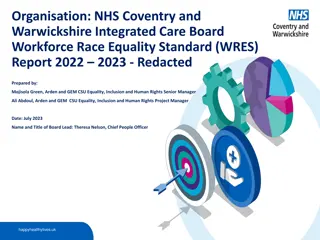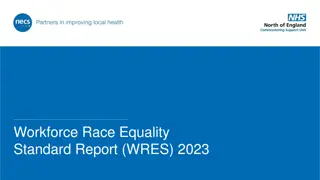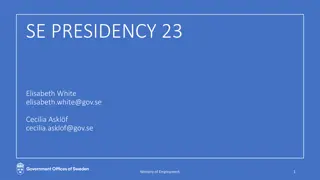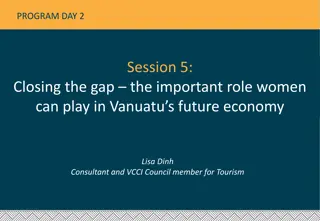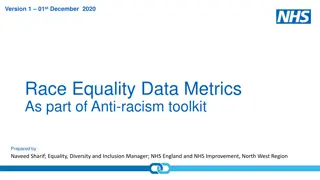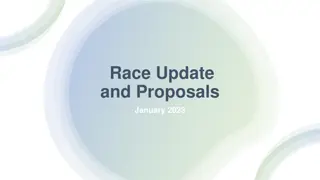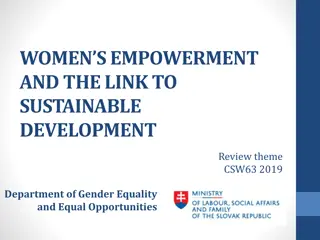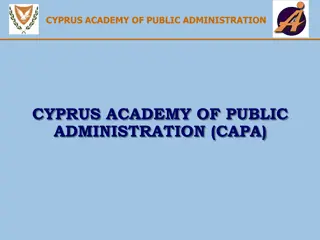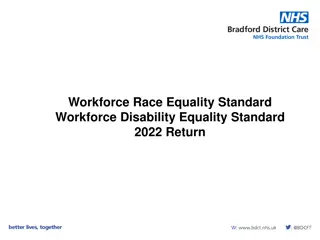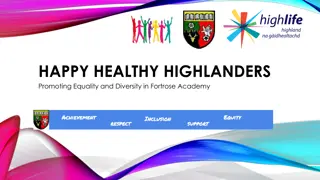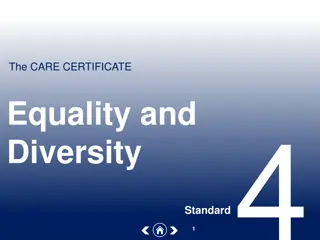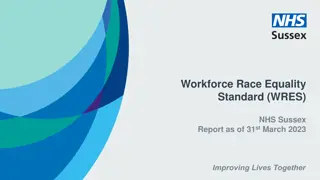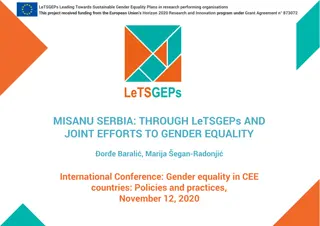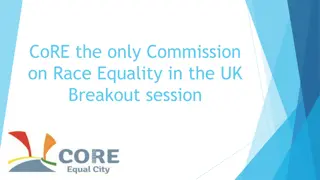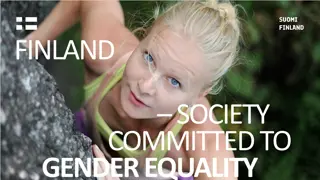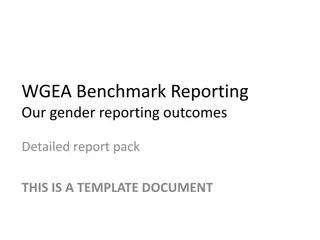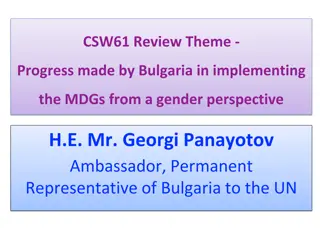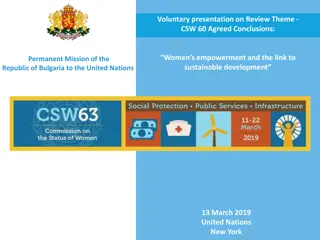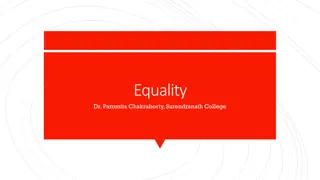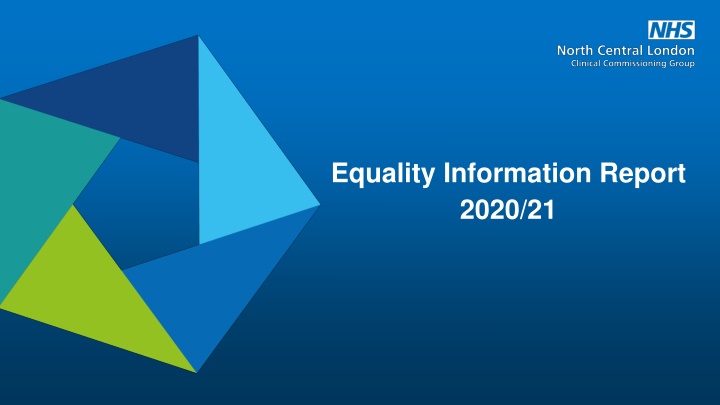
North Central London CCG Equality Information Report 2020/21 Summary
The North Central London CCG Equality Information Report 2020/21 outlines how the organization is fulfilling its duties under the Equality Act 2010, focusing on advancing equality for patients and staff. The report covers key equality issues, workforce priorities, and the organization's approach to diversity and inclusion. It also details the Equality Objectives & Interim Action Plan for 2020/21, which includes initiatives to address health inequalities, workforce issues, and organizational competencies. Stay informed about NCL CCG's commitment to equality, diversity, and inclusion through this comprehensive report.
Download Presentation

Please find below an Image/Link to download the presentation.
The content on the website is provided AS IS for your information and personal use only. It may not be sold, licensed, or shared on other websites without obtaining consent from the author. If you encounter any issues during the download, it is possible that the publisher has removed the file from their server.
You are allowed to download the files provided on this website for personal or commercial use, subject to the condition that they are used lawfully. All files are the property of their respective owners.
The content on the website is provided AS IS for your information and personal use only. It may not be sold, licensed, or shared on other websites without obtaining consent from the author.
E N D
Presentation Transcript
Equality Information Report 2020/21
Introduction Publishing equality information every year is a specific duty under the Equality Act 2010. Our Equality Information Report, also known as the equality duty report, provides information about how the North Central London CCG is meeting its Public Sector Equality Duty (PSED), making continuous improvement by tackling discrimination and by advancing equality for patients and staff for the period 2019/2020. This report has been compiled with contributions from CCG commissioners, communication and engagement and HR teams. We have divided our Equality Information into three sections to ensure, openness, transparency, and relevance: We publish this information on our website under Equality and Diversity- and it s regularly updated by the Communication Team and the Senior Equality, Diversity, and Inclusion Manager. This information covers the NCL CCG s duty under the Equality Act 2010 and how we are meeting the duty; our commitments to diversity, and inclusion. It highlights the key equality issues- and how the CCG communicates and engages with the public, patients, carers and staff. This section of the report shows how the CCG has delivered its equality objectives during 2020/2021 and provides a reference to the source documents where appropriate. This part of the report provides information on the performance against the equality objectives regarding responding to Covid-19, health inequalities and the commissioning of services by the CCG (see slides 3 to 20). This section of our Equality Information Highlight Report provides a summary of the CCG s progress against the workforce priorities, with reference to the Workforce Race Equality Standard Report (WRES) which the PPEE Committee approved in August 2020. This section includes workforce and Governing Body equality information- and a section on how the NCL STP teams have been working to advance equality across NCL (see slides 21 to 27). Please see the 2020/21 full WRES report on the website under Equality and Diversity. Equality Information Highlight Report 2020/21 2
Performing beyond mandatory compliance An overview of NCL CCG s approach to Diversity and Inclusion Equality Information Highlight Report 2020/21 3
Equality Objectives & Interim Action Plan (2020/21) Following the merger of the five NCL CCGs to a single CCG, we started refreshing the Diversity and Inclusion Strategy for 2021/23. During early engagement with key stakeholders we prioritised a number of areas and set an interim Action Plan for 2020/21 that was agreed by the CCG Executive Management Team and the Public and Patient Engagement and Equalities Committee. Priorities Actions 1.1- Developing a Race and Ethnicity Health Inequalities Programme 1.2- Developing a vaccine campaign targeted at the BAME and vulnerable groups 1. Responding to COVID 19 and addressing health inequalities 1.3-Carry out single or multi agency equality impact assessments of new and/or transformational programmes 1.4-Develop health inequalities baseline information covering all protected and vulnerable groups 2.1- Developing a WRES Action Plan that will be underpinned by an OD plan and activities 2. Addressing workforce issues and implementing Staff Networks Recommendations 2.2- Supporting staff networks, developing programmes and promoting activities 2.3- Delivering training and awareness raising programmes 2.4 Completing equality impact assessment of the restructuring 3.1- Developing a set of values that encompass our commitment to equality, diversity and inclusion. 3. Building organisational competencies and capacity. 3.2- Having continuous conversations about equality, diversity and inclusion at all levels. 3.3- Improving tools and processes including PDR and data monitoring 3.4- Mapping out resources to ensure ED&I work programmes are adequately supported Equality Information Highlight Report 2020/21 4
Inclusive engagement with diverse communities to address inequalities
Embedding the Resident and the Patient Voice into CCG Planning and Decision-Making As a newly-formed organisation, a priority for NCL CCG was ensuring that the resident and patient voice was embedded at the centre of our planning and decision making including: Developing a new Patient and Public Engagement Strategy (2020-22), providing an overarching framework that ensures high quality patient and public engagement work is embedded across the CCG. Our strategy has a specific objective which is focused on ensuring that the range of voices informing our commissioning reflects the diversity of our communities, including those who are socially excluded, vulnerable or experience the worst health. Establishing a Pubic and Patient Engagement and Equalities (PPEE) Committee, chaired by our Governing Body Lay Member for patient and public engagement. The Committee is responsible for assuring the Governing Body that we meet our statutory duties to engage effectively with patients and the public, and membership includes Healthwatch representation and Community Members. The Committee responsibilities include oversight of the CCG s compliance with the Public Sector Equality Duty. Establishing a dedicated Communities Directorate to ensure that the CCG is giving regard to the need to reduce inequalities between residents in access to, and outcomes from healthcare services. Recruiting members of the public to the role of Community Member on our committees. Community Members provide a community/resident perspective on items brought to CCG committees, as well as a broad range of professional and personal experience that enhances our discussions. Playing an active role as a partner within the NCL Integrated Care System in promoting and seeking to strengthen the ways we listened to communities and ensure their diverse voices are heard. One of the ways we do this is through the NCL ICS Engagement Advisory Board, with a membership made up of CCG colleagues, local authority councillors who lead on health and care matters, Healthwatch organisations and representatives from our voluntary and community sectors. In addition to NCL wide structures, each of the CCG s 5 boroughs has their own local engagement groups and networks (the Annual Report on our website has full details). Equality Information Highlight Report 2020/21 6
Examples of community engagement in 2020/21 Our CCG Annual Report for 2020/21 (pages 50-72) gives a really good overview of the work we have been doing to this year to engage with our communities on a variety of programmes, in our core commissioning, and in particular, throughout the Covid-19 pandemic. The Annual Report is available on our website: www.northcentrallondonccg.nhs.uk The examples given in the Annual Report specifically highlight how we have been identifying the communities we most need to reach, hear from and support, and many examples of how we are working in partnership with other organisations to do this. Examples are given from our work at the NCL level, in our local boroughs and also as part of the developing North Central London Integrated Care System which identifies the work the CCG has undertaken with Local Authorities, Providers and primary care organisations. We also provide reports to our PPEE committee on a quarterly basis on the CCG s community engagement activities, who we have engaged with and the impact it has had. On the next few slides, we have shared a few examples of work we have done this year to engage with our population as a whole and specific communities and groups. Equality Information Highlight Report 2020/21 7
Covid-19 vaccine engagement across NCL In NCL, the CCG has worked closely with partners to deliver a range of community engagement and communications work to encourage equitable uptake across all communities in our boroughs. A few examples are below: Coordinating a significant programme of local community events, including events with the Black Caribbean, Roma and Somali communities hosting events in a range of languages (including Turkish, Bengali and Spanish) plus supporting grassroots organisations to host their own events, attending existing community meetings and identifying local healthcare professionals of diverse ethnicities to speak at events etc.; Developing community advocate packs for organisations to use, and building up relationships with local faith leaders; Video creation in different languages with local community groups, local community and faith leaders, local influencers (e.g. Arsenal football team); Tailored messages, information and online events to engage with social care and healthcare staff to tackle concerns and build confidence; Running pop-up vaccination clinics at community sites including at local hostels, mosques and churches; Setting up a hub for people with learning disabilities, autism and phobias to support those requiring a calmer environment; Coordinating visits to vaccination centres by local MPs and councillors, who have supported getting messages out to their constituents. Equality Information Highlight Report 2020/21 8
Covid-19 vaccine engagement across NCL continued In Enfield, with the support of the CCG Engagement Team, Samafal Family Association had initiated two WhatsApp groups targeting Somali mothers and elderly men respectively. These two groups consist of about 80 people. The two WhatsApp groups were brought together on 12/03/2021, which included 2 Somali speaking practice nurses, to organise a Zoom meeting to provide clarity and fact- checking on the COVID-19 vaccine. They had no external visitors to the meeting to increase the confidence, safety and consistency in messaging of the group. Only 1 person had booked for the vaccine prior to the meeting. Over 90% of the attendees stated that they would book for the vaccine following the meeting. NCL CCG has also partnered with London Metropolitan University on a quantitative and qualitative research project exploring vaccine barriers, with a focus on those communities most impacted by the effects of the pandemic. NCL residents have been surveyed to understand their attitudes to the vaccine, with further 1:1 qualitative interviews to gain a more in-depth understanding of barriers. The research will be analysed by the university health economics team and used to create a set of recommendations to address these barriers. Equality Information Highlight Report 2020/21 9
Key engagement activities NCL consultation on planned orthopaedic surgery We have undertaken a formal public consultation on the future of planned orthopaedic surgery for adults. Many of the consultation activities were developed or specifically targeted to seek the involvement of those identified in our Stage 2 Integrated Health Inequalities and Equalities Impact Assessment (IHIEIA) as being impacted by the proposed changes. The feedback from stakeholders and members of the public from the consultation were independently evaluated and the consultation was awarded Best Practice by the Consultation Institute. Community Research and Support Programme (Islington) In Islington, we work with our local voluntary and community grassroots organisations to commission an annual research and support programme gathering vital insight into our most vulnerable residents lives, and their experiences of accessing health and care services and wellbeing support. This year we have focused on digital exclusion and the impact of COVID-19 on our vulnerable communities and are working with a diverse mix of community organisations including a partnership of Healthwatch and ten migrant and refugee organisations. Through the programme, we are also able to signpost local people to healthcare services and identify particularly vulnerable members of the Islington community with more complex needs and additional support requirements and enable them to more easily access health services or wellbeing support. This work has fed into our Digital Inclusion Steering Group and a commissioned Equality Impact Assessment analysing the impact of the move to digital health services for our local communities. Equality Information Highlight Report 2020/21 10
Key engagement activities Continued Supporting people with a learning disability to have their smear test (Barnet) We worked with Barnet s Public Health Team to develop a patient video to encourage patients with a learning disability to have their cervical screening test. We involved patients with a learning disability and Barnet Mencap in the production and this has been shared across NCL. Adult Carers Strategy co-production (Haringey) The CCG, Haringey Council and our health and social care partners co-produced a multi-agency Haringey Carers Strategy in October 2020 to support those who look after adults in need of care and support. Engagement to support the development of the strategy started in February 2020 with nearly 60 carers attending an event to discuss their experiences and ideas about improvements. Outputs from the day helped to inform the resulting strategy, and also facilitated co-production, as a number of carers agreed to subsequently work with us in a Carers Working Group to develop the strategy. The strategy was further developed during meetings and one to one discussions with a range of carers including the Carers Reference Group. Cancer commissioning (Barnet) Cancer commissioners have been working on a project to transfer the delivery of hormone injections for prostate cancer patients to primary care. The project team worked with three patients representing older, Black males and those living in deprived areas with a higher risk of cancer to develop a patient-friendly letter to be sent to all service users across NCL to inform them of the change. The team also focused on cancer screening and care recognising the impact lockdowns have had on local communities. Equality Information Highlight Report 2020/21 11
Key engagement activities Continued Focus on Reducing Health Inequalities (Camden) Reducing health inequalities continued to be a focus throughout 2020/21. We collaborated with Health and Wellbeing Board partners and community group networks to collate evidence under the Camden Joint Strategic Needs Assessment on diabetes, cancer, frailty, falls, Chronic Kidney Disease (CKD), Chronic Obstructive Pulmonary Disease (COPD) and alcohol to highlight inequalities among sex/ethnic groups and take recommendations forward in these areas. Community webinars (Enfield) Enfield has also run three webinars focused on COVID-19 vaccination uptake in hard to reach groups in the borough. The Communities Webinar which was the first had a broad population approach based on data that BAME communities had a higher mortality rate for COVID, as well as vaccination hesitancy. This Enfield event focused on providing advice and information, how we can support communities to make an informed choice and acknowledging and addressing concerns that communities have about the vaccine or their experience of the NHS. From this successful webinar, we have expanded this model to target other community groups. The Enfield webinars are available online and we intend to expand from this model of direct engagement on the vaccine to support engagement on wider health inequalities and issues around access, building lasting positive relationships with our communities. The work of our Communities Team (Health Inequalities) This year, we established a dedicated Communities Team to ensure that the CCG is giving regard to the need to reduce inequalities between residents in access to, and outcomes from healthcare services. A full write up of the team s successes and areas of focus is available in the Annual Report p73-78. Equality Information Highlight Report 2020/21 12
Communities Team- Addressing health inequalities across North Central London
NCL Communities Team In 2020, a Communities Team was established to ensure that the CCG is giving regard to the need to reduce inequalities between residents in access to, and outcomes from healthcare services. The team s core activities are in line with the CCG s equalities duties, applying equalities to all our functions and taking learning from COVID- 192 to cover: Working with teams across NCL to reduce variation in access, outcomes and experience; Identifying the highest priority needs to address to achieve this including through review of the traditional understanding of need ; Supporting the development and delivery of interventions to reduce health and wider inequalities; and Recommending change to priorities and/or decision making approaches where this will support greater equity and equality. Fostering and spreading a culture of equality and ensure addressing health inequalities is an integral part of everyone s role. Equality Information Highlight Report 2020/21 14
NCL Communities Team key activities in 2020- 2021 1. Implementing proportionate universalism Inequalities fund 2.5m focused on 20% of most deprived wards Bid funding NHS Charities 670k, Hypertension & Diabetes inequalities 190k Developing thinking on new system funding formulae 2. Working differently with communities to respond to inequalities Community Participatory Research and family health in Enfield 3. Inclusion health Supporting rough sleepers and asylum seeker health Equality Information Highlight Report 2020/21 15
NCL CCG Inequalities Fund: Rationale and Principles An Inequalities fund is being used to address the growing disparity between our most deprived and least deprived communities. In line with the national 2021/22 Planning Guidance, the fund will be used to prioritise activities and interventions in the most deprived 20% areas, with an aim to improve their access, experience and outcomes. The objectives of this fund are as follows: Seeking innovative and collaborative approaches to delivering high impact, measurable changes in inequalities across NCL Identifying solutions to break down barriers between organisations and develop both new and extend existing relationships Targeting the most deprived communities and to reach out proactively to our resident black and minority ethnic populations Help Borough, Multi-Borough and NCL wide partnerships to deliver high impact solutions Engage our population, the VCS and our partners across health and care in making a difference in the lives of our people Each Integrated Care Partnership within each Borough will be able to bid for a proportion of the initial 2.5m, with funds relative to needs in each borough. All health and care partners will need to approve the submitted plans, which will be assessed by an NCL wide panel. Equality Information Highlight Report 2020/21 16
NCL Inequalities Fund: Overview of approved schemes Borough Focus Expected Impact on Inequalities Working with those communities whose language, culture, deprivation or other barriers preventing them from taking control of their health and accessing services. Reduction in barriers to accessing services and improved health outcomes as a result. This will address the holistic needs of these communities to ensure they are able to receive the correct mix of service support. This will ensure equality of access to services and support. Islington Working with >100 High Intensity Users per year to engage them with the wider health and care system. Reduction in the frequency of urgent care needs arising, provision of more holistic support to people, and an improvement in their overall quality of life. Enfield & Haringey Holistic Support for people with SMI noting the extremely poor long term outcomes for this community. This will ensure that health outcomes for people with an SMI are improved by addressing both their MH and physical health needs as well as tackling issues around social isolation and improving employment opportunities. This will reduce the long-term health outcome inequality that exists between people with SMI and the wider community. Islington Targeted interventions for people at risk of developing an LTC in deprived communities. Through supporting people to address the social determinants of health as well as improving health education we will reduce the prevalence of LTCs in deprived communities with the aim of levelling the prevalence rates to those of more affluent communities. Enfield & Haringey Reducing the incidence of preventable oral disease in <5s in deprived communities. Through tackling the strong correlation between deprivation and poor oral health this programme will the incidence of oral disease and therefore bring outcomes to a level similar to more affluent communities. Barnet 17 17
NCL Inequalities Fund: Anticipated Impact on Inequalities Borough Focus Expected Impact on Inequalities Reducing the incidence of children <1 attending ED with preventable illnesses and diseases. This will help educate new and young parents to better understand child health and will also address family wellbeing with the aim of improving confidence. The workshops will work out from the child to address lifestyle issues affecting long- term health in the wider family. Enfield & Haringey Improving the quality of Annual Health Checks and Health Action Plans for people with LD. This will provide assurance and consistency around both AHCs and HAPs as well as ensuring the actions identified are followed through. The aim is to reduce the health inequalities experienced by people with LD compared to the wider population and through this improve outcomes. Camden Engaging MH service users at risk of an admission or following an admission to develop resilience. Through supporting this community to develop effective crisis management strategies and engage them in activities aimed at reducing social isolation and aid recovery we will reduce the long-term health outcomes experienced by MH service users compared to the wider population. Haringey The introduction of race equality and lived experienced into working with people with Autism. The aim is to reduce the inequalities experienced by people with Autism, which is especially poor in deprived families and some ethnic communities. This will reduce the frequency of people falling into the Mental Health Crisis and reduce social isolation with the long-term aim of reducing the early mortality experienced by many autistic people. Camden 18 18
Community Participatory Research Childhood obesity - Enfield NCL CCG Transformation funding of 150k with further 250k from London Borough of Enfield Background Health inequalities are entrenched in some parts of Enfield. Enfield has greater needs in NCL, London, and England in terms of childhood obesity. There is also a direct correlation with deprivation. Our aim is to ensure positive impact on health and co-design solutions to produce equitable outcomes. We know that the impacts on obesity are wider than health and we need to understand what is going on for people and co-design solutions Approach Developing a Conversation using community participatory research and community health champions to engage with communities and strengthen our relationships and unpick underlying causes and barriers Alongside quantitative data through risk stratification to build a Borough profile to support intervention planning Funding allocated to trial neighbourhood determined interventions to address the high prevalence rates identified above. Equality Information Highlight Report 2020/21 19
Rough sleepers and people experiencing homelessness Across NCL (CCG and Councils), we have been successful in securing funding to support Out of Hospital Care for rough sleepers and people experiencing homelessness. Funding across NCL: 232k in 20/21 and 1m in 21/22. This funding will be used for: Specialist Homeless Intermediate Care Team aligning to Discharge to Assess pathways and offer comprehensive assessment and rehabilitation support along with resettlement workers with lived experience. Move on Coordinators to coordinate a wide range of support including housing, mental health, substance misuse, social care and employment with the aim of re-settling homeless people into the community and reducing the use of unnecessary emergency services. Step down and step up accommodation for rough sleepers and people experiencing homelessness to reduce the impact on emergency health services. 20
Staff and Governing Body Diversity Information
Diversity Information Context to CCG s workforce diversity and inclusion performance Since the merger, the CCG focused on prioritising the common workforce inclusion issues that needed to be addressed. Based on the WRES Report and Staff Survey results, a quick-wins plan was developed in consultation with EMT, staff-side and external stakeholders including NHSE/I that helped the CCG deliver inclusion activities between July 2020 and March 2021, resulting in the development of a robust set of programmes for 2021/22. Establishing the CCG values that encompass the CCG s commitment to equality, diversity and inclusion these have been publicised to staff and the public and are now being embedded within everyday CCG practices, processes and policies. Building better workforce inclusion Having continuous conversations about equality, diversity and inclusion at all levels sessions have and continue to be arranged with staff, EEMT and EMT. Delivering training and awareness raising programmes linked to the work of the staff networks/OD and staff survey action plans. Equality Information Highlight Report 2020/21 22
Diversity Information As part of the CCG s commitment to diversity and inclusion, this section of the workforce report shows the CCG workforce profile status at 31 March 2021 in the areas of ethnicity, religious belief, age, gender, disability, marital status, and sexual orientation. Equality Information Highlight Report 2020/21 23
Diversity Information Staff Profile by Ethnicity Governing Body members by ethnicity The CCG publishes the GB Members diversity information as part of the Workforce Race Equality Standard requirements. The data is compared against staff and the local demography. 2019-20 2020-21 (collective legacy NCL CCGs data) GB Members CCG staff GB CCG staff Members White 40% 60% 64% 59% BAME 60% 40% 36% 41% Source: WRES Report 2020/21 Equality Information Highlight Report 2020/21 24
Diversity Information Key notes on the staff data: 39% of the CCG s workforce are from BAME backgrounds- and 56% from White backgrounds. Based on self-disclosed data, there has been a small increase in the percentage of BAME staff (2%) and a small reduction of White staff in Bands 8a and above jobs (1%). However, a higher proportion of CCG staff in roles that are band 6, 7 and 8a are from a BAME background than a white background. In contrast, a significantly higher proportion of staff in roles that are band 8c, 8d, 9, and VSM are from a white background than a BAME background. One-fifth (19%) of the CCG staff have not disclosed their sexual orientation; 4% of staff have declared to be from LGBT backgrounds. The majority of staff in the CCG have not declared their disability. 5% of the workforce have declared to have a disability. The majority of staff are within the age 31-40 age bracket, followed closely by 41-50. The majority of the CCG workforce are female (69%). Equality Information Highlight Report 2020/21 25
Key activities in 2020/21- workforce The CCG continued making good progress in delivering its workforce equality objectives. The key areas of priorities in 2020/21 included recruitment, bullying and harassment, and supporting staff. The CCG set up and launched a Diversity & Inclusion Steering Group, the BAME Staff Network, Disability Staff network and LGBT+ Staff Network. Significantly reduced the gaps between White and BAME staff in all bands. The representation of BAME staff increased in senior bands (8a and above) and White staff in lower bands. The likelihood of BAME staff being appointed increased in 2020/21 as White staff being appointed from the shortlisting stage decreased consecutively from 2.39 times higher in 2018/19 to 1.14 times higher in 2020/21. Each staff network has developed a work programme to support the CCG s diversity and inclusion priorities including, awareness raising programmes and events, setting up a dedicated intranet page for diversity information, celebrating key events and setting up a book and film club.. Robustly responded to the likely impact of Covid 19 on staff that were at risk, particularly BAME staff and those with a disability. A series of measures were introduced based on national guidance including improved communication, engagement and risk assessment. During 2020/21 the CCG introduced a Health and Wellbeing Programme which included the introduction of weekly Mediation sessions, Mental Health wellbeing sessions delivered by experts from a local NHS Mental Health provider organisation. Strengthened the appraisal system to ensure that each employee contributes successfully to the delivery of the CCG s objectives, including diversity and inclusion objectives. Developed and promoted the Agile Working Policy, alongside the Flexible Working Policy to support staff to maintain work-life balance and good health and wellbeing. Equality Information Highlight Report 2020/21 26
Key activities in 2020/21- workforce Safe Space Conversations- using lived experiences of staff in shaping our objectives The Governing Body and Executive Management Team gave their full support by endorsing the work of staff and provided the necessary communications resource and management support. These conversations evolved organically and highlighted the issues facing staff in the CCG, and in the wider system. Safe Space Conversations was initiated by our BAME colleagues following the George Floyd's murder to support the CCG address racial discrimination and improve staff experience in the organisations. The groups developed their own Terms of Reference and Ground Rules. Individuals volunteered to join Safe Space Conversations and share their lived experiences, providing insight into how they live with experiences of microaggressions, abuse, discrimination, bullying and harassment at work- and recommended solutions. Based on the recommendations, the CCG has developed a set of Quick Wins and CCG Equality Objectives and Action Plan Equality Information Highlight Report 2020/21 27
ICS Workforce System Development & Partnership
Setting workforce inclusion priorities NCL ICS Workforce priorities Our NCL ICS workforce high impact priorities are aligned with the NHS People Plan and London People Board priorities: Equality, diversity, and inclusion Staff wellbeing and tailored health and wellbeing programmes Talent management, progression, and career pathways Local workforce recruitment routes into health and care employment Workforce planning and modelling based on population health and needs Working with & across sectors We have been working on different projects and system development initiatives that contribute to these priorities. Equality Information Highlight Report 2020/21 29
Developing collaborative working NCL ICS Workforce Programme activities include: Building wide-reaching forums across the system to agree on coordinated ways of working including establishing: NCL People Board, NCL Workforce Executive Group, NCL EDI group, HR Directors & Deputy HRDs networks A growing NCL Workforce Network, with over 200 staff across social, primary, and secondary care systems. We have already held four co-production events with the network. Development of the NCL Nursing Programme supporting the national nursing expansion of 50,000 nurses and focused on a system approach to increasing the recruitment and retention of nurses in NCL Pathfinders Retention Programme supporting the retention of staff in Health and Care via initiatives concentrated on the following areas: Health and Wellbeing; Great work-life balance; Career Development and Talent Management; Equality Diversity and Inclusion. Staff wellbeing hub that has engaged nearly 1300 staff. Building on the forums we have set up to further develop: collaboration, shared learning and best practice. working groups to take forward workstreams at an ICS level e.g. talent management. principles and frameworks to formalise an ICS approach across a number of programmes. objectives for high impact priorities e.g. development of EDI objectives through the EDI group. programme and project plans including developing baseline data with system partners Equality Information Highlight Report 2020/21 30
Appendix 2: Equality Objectives Action Plan (2021 - 2022) Appendices: Forward Action Plans Appendix 3: WRES Action Plan 2021-22
Appendix 2: Equality Objectives Action Plan (2021 - 2023) This annual action plan has been developed based on the CCG s current priorities to deliver the inclusion objectives in 2021/22 Objective Actions Ensure robust EqIA of all commissioning programmes including Accelerated Elective Recovery Programme, and all strategic review programmes [ 1 ] Support the ongoing response to Covid-19 pandemic and vaccination programme and ensure equity. Develop health inequalities baseline information covering all protected and vulnerable groups Tackle health inequalities and strengthen the system approach to population / place-based health and care management Develop a Population Health and Health Inequalities Strategy Ensure inclusive engagement of all patient groups in local and NCL service design/review and decision-making- and address digital exclusion. Develop evidence based staff wellbeing and recovery following on from the impact of Covid-19 on staff and continue offering flexible working arrangements based on individual circumstances. Strengthen recruitment practices to require greater diverse recruitment panel membership and recruitment and selection training. [ 2 ] Introduce a reciprocal mentoring programme, implement a job shadowing programme and ensure equity in career progression and promotion. Recruit a reflective workforce at all levels and implement a fair and just organisational culture. Co-design workforce programmes with staff networks, support safe space conversations, launch the See ME First Campaign. Implement the staff survey action plan 2021/22, especially ensuring the implementation of Freedom to Speak Up Ambassadors, Mental Health Champions, educational/training sessions to raise awareness and embed the CCG values in everyday practices. 32
Appendix 3: WRES Action Plan 2021-22 Work has been underway to address the key issues and gaps identified from the 2020 staff survey results with the development of the corporate staff survey action plan. The corporate action plan correlates to the actions against the WRES indicators, and therefore the following table shows the progress we have started to make against each of the indicators and actions. WRES Indicator Action Lead (s) Ian Porter Progress so far 1. Percentage of staff in each of the AfC Bands 1-9 and VSM (including executive Board members) compared with the percentage of staff in the overall workforce. (clinical and non-clinical) 2. Relative likelihood of BME staff being appointed from shortlisting compared to that of White staff being appointed from shortlisting across all post (internal and external) Ensure sustained GB and EMT commitment to improving BAME representation in senior roles. Range of EMT actions including reciprocal mentoring, shadowing and inclusive recruitment panel being rolled out. Ensure sustained progress by strengthening recruitment. Darshna Pankhania & Emdad Haque Recruitment framework is being developed to review the end-to-end recruitment process to ensure fairness, which includes establishing a pool of diverse panel members and robust recruitment and selection training. To be monitored via the monthly and quarterly workforce performance reports. 3. Relative likelihood of BME staff entering the formal disciplinary process, compared to that of White staff entering the formal disciplinary process, as measured by entry into formal disciplinary investigations. Continue monitoring disciplinary cases in line with the NHSE/I s closing the gap framework plus the CCG s value and See ME First Campaign. Ensure fair access to training budget and encourage take up. Improve recording of training attendance Develop and implement the 2020 Staff Survey Action Plan. Continue supporting Diversity Staff Networks. Promote See ME First Campaign Promote Speak Up initiatives Design learning initiatives and continue leadership conversations Darshna Pankhania & Raksha Merai Courine Stewart 4. Relative likelihood of BME staff accessing non-mandatory training and CPD as compared to White staff. Training budget agreed for each employee corporate training programme is due to be rolled out in September 2021 Staff Survey Action Plans developed which include specific initiatives including training, reciprocal mentoring, shadowing. BAME Staff Network delivering safe space conversations, book and film club, See ME First, and recruiting diverse panel members. 5. Percentage of staff experiencing harassment, bullying or abuse from patients, relatives or the public in last 12 months. 6. Percentage of staff experiencing harassment, bullying or abuse from staff in last 12 months 7. Percentage believing that CCG provides equal opportunities for career progression or promotion. 8. In the last 12 months have you personally experienced discrimination at work from any of the following: Manager, Team Leader, Other Colleagues? 9. Percentage difference between the organisation s voting membership and executive membership of the Board Ian Porter & Darshna Pankhania Improve self-disclosure of ethnicity amongst GB members/Office Holders. Ian Porter & Darshna Pankhania 33

